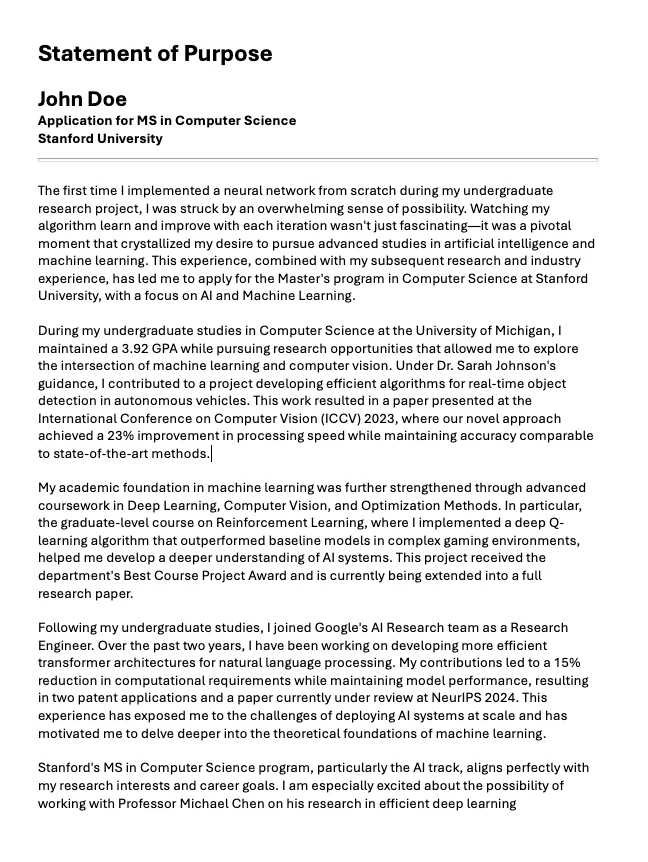Learning is a never-ending process. It might seem like only yesterday since you went off to finish your undergraduate studies. Now, you are preparing your application tools needed for grad school applications. The application to graduate school is no different from your bachelor’s degree. In addition, the requirements are strict. For school applicants, the documents needed to be admitted for grad school can be confusing. One of these is a statement of purpose for school admission.
What is it? To get a full idea of writing your personal statement, let’s first define a statement of purpose.
What is a Statement of Purpose?
Sometimes referred to as a personal statement, a grad school SOP (Statement of Purpose) is not like a typical essay. The goal of writing a grad school document is to highlight your interest in your chosen field of study. You must detail the reasons you are choosing that specific program and their school. In its essence, your statement of purpose should be able to answer the following questions:
- Why do you want to study the program?
- How do you intend to apply the learnings gained from grad school?
- What drives or motivates you to pursue a master’s degree/internship/medical residency program?
Basically, the statement of purpose is a roadmap of where you are in your career and how you want to progress as you complete the program and earn your degree. Bear in mind that the most important aspect of your application focuses on you as a good fit for the school. Moreover, tell something about your personal background, objectives, and career history.
Aside from convincing the admissions committee that you are the right candidate for their school, a statement of purpose is a testament of your writing abilities as well. When you pass the screening and you’re doing your graduate studies, there are lots of research statements to write as well as essays. Having that said; writing at least 10-page long documents is a normal occurrence. With that in mind, a good statement of purpose reflects how coherent—and competent—of a writer you are.
Difference Between a Cover Letter and Statement of Purpose
Before you can get past the screening, you’ll need to submit your school requirements, resume, cover letter, and a statement or purpose. So, what’s the difference between the two narrative documents?
Cover Letter
A cover letter presents a more direct opportunity to tell a particular school about your past successes and future career goals. With just one page, you should grab the attention of the reader. It must point out your experience and give the reviewer an overview of why you want to pursue the application. With a cover letter, you’re demonstrating who you are without the constraints of addressing a school and specific field of study.
Statement of Purpose
All graduate and professional schools require a written statement as part of the application process. Often, you’ll find the requirements for the program in the university’s ‘apply now’ page. Each of the graduate schools may have unique requirements for these documents, emphasizing the applicant’s motivations and qualifications. Even though the terminology differs, the applicant’s intended area of study has a distinct information that needs to be included.
While this application tool is known as statement of purpose, some universities prefer calling it personal statement, personal narrative, or admissions essay, among others. Despite the name, it all serves its objective: Describe one’s professional and personal aspirations and goals.
Some applications are about a narrative of your professional and personal attributes. On the other hand, some of them require responses to a series of questions. The utmost importance of the statement is to let the admissions officers that you have aspirations and motivation to complete the degree.
What is the Importance of a Statement of Purpose for Graduate School?
Suppose you are applying to a university abroad. A statement of purpose is one of the most important pieces you have to prepare alongside your other documents. You may see it as a narrative document that is two to three pages long, but it is your key to study your desired program at the university that you choose. Your personal statement is the best way to stand out among the candidates applying for the program. Make sure to leave room for your creativity when highlighting your accomplishments and extracurricular achievements.
Writing your personal essay is like solving a puzzle—you are wondering if your document can unlock the door of opportunities for you to receive the letter of acceptance. The admissions committee will be reading tons of applications, so details matter in order for you to be accepted. Your statement of purpose should be concise; it’s best to use clear language and check your grammar as well.
Remember, a statement of purpose gives the school an inside view of your personality outside of your academic performance. Moreover, by reading your essay, the committee can determine if you’re a good fit for the campus culture and if you possess the qualities of a successful graduate student. It gives you a chance to prove that there’s more about you than just your GPA.

Researching Your Target Graduate Program
Researching your target graduate program is a crucial step in writing a successful statement of purpose. This involves gathering detailed information about the program’s curriculum, faculty, research opportunities, and campus culture. Start by visiting the program’s website to get an overview of what they offer. Dive into the specifics by reading about the faculty’s research interests and expertise. Reaching out to current students or alumni can also provide valuable insights into the program’s environment and expectations.
Some key things to research include:
- The program’s curriculum and course offerings: Understand the core courses and electives available. This will help you explain how the program’s structure aligns with your academic interests and career goals.
- The faculty’s research interests and expertise: Identify faculty members whose research aligns with your interests. Mentioning specific faculty in your statement can demonstrate your genuine interest in the program.
- Research opportunities and facilities: Look into the labs, centers, and resources available for research. Highlighting these can show that you’ve done your homework and are excited about the opportunities the program offers.
- Campus culture and extracurricular activities: Understanding the campus culture can help you explain why you’re a good fit for the program. Mentioning relevant clubs or organizations can also show your enthusiasm for being an active part of the community.
- Funding and scholarship opportunities: Knowing about available financial support can help you plan your application and show that you’re prepared for the financial aspects of graduate school.
- Career outcomes and alumni success stories: Researching the career paths of alumni can help you articulate how the program will help you achieve your career goals.
By conducting thorough research, you can show the admissions committee that you have a deep understanding of the program and are genuinely interested in attending. This level of detail can set your statement of purpose apart from others and demonstrate your commitment to your chosen field.
Developing Your Statement of Purpose Idea
Developing your statement of purpose idea involves brainstorming and outlining your thoughts, experiences, and goals. This is a critical step in writing a successful statement of purpose, as it will help you clarify your ideas and create a cohesive narrative.
To develop your statement of purpose idea, start by brainstorming answers to the following questions:
- What are your academic and career goals?: Think about where you see yourself in the future and how the graduate program will help you get there.
- Why do you want to attend graduate school?: Reflect on your motivations for pursuing further education. Is it to gain specialized knowledge, conduct research, or advance your career?
- What research experiences have you had, and how have they prepared you for graduate school?: Consider your past research projects, internships, or relevant work experiences. How have these experiences shaped your academic interests and prepared you for the challenges of graduate school?
- What skills and strengths do you bring to the program?: Identify your key strengths, whether they are technical skills, problem-solving abilities, or leadership qualities. How will these skills contribute to your success in the program?
- How do you plan to contribute to the academic community?: Think about how you can add value to the program. This could be through research, collaboration, or participation in extracurricular activities.
Once you have brainstormed answers to these questions, create an outline to organize your thoughts. This will help you structure your statement of purpose and ensure that it flows logically. A well-organized outline can make the writing process smoother and help you create a compelling narrative that captures the admissions committee’s attention.
Statement of Purpose: A Checklist of What to Keep an Eye For
The hardest part of moving into your next goal is getting started. It goes the same with starting to write a piece for a school admission. Having a template can help create a structure or flow of your content, but it’s hard to know if you’ve met the criteria. Check out these tips to know what you should bear in mind before you write your first story to present yourself as a successful graduate student.
1. Steer Clear of Plagiarism
First things first: Write using your own words. Having a template or sections copied from the internet will just drag you down. This means avoiding copying from general templates or statement of purpose of someone else.
To prevent yourself from committing this mistake, better to cross-out a generic statement and emphasize ambitions, upbringing, and goals that are uniquely yours. Make sure to let them know why you stand out among the rest.
2. Let Your Tone Be in Active Voice Rather Than Passive
Demonstrate everything backed by evidence. Don’t simply say you are equipped with leadership skills; show them how you’ve managed actual situations like a leader.
3. Tell a Story—What Makes You the Person You are Today
Tell them something about your interests, along with what sparked those interests to pursue a graduate study. Let yourself loose; be creative, but stay on point.
4. Include Measurable Quantities
Aside from giving them an in-depth understanding of who you are and what you did in your past experiences and studies, provide numbers or concrete data that can add credence to your statement.
5. Decide How You Want to Portray Yourself
It is imperative that your statement of purpose speak of your personality and character. Most of the time, the character that you want the committees to see is based on their questions. Take advantage of aligning who you are with who they want to study in their university.
Here’s an example of how you can portray yourself in the essay:
I believe that continuous learning is needed to address the complexity of principles and concepts related to data-driven transformations. Similar to these viewpoints, I have set my focus toward broadening my knowledge to grow and maximize my potential as an employee and as an individual. Additionally, I am highly passionate about achieving success in life; and I believe that continuing education can help me utilize the skills and resources that I possess more efficiently.
6. Check the Requirements of the School
You might be asking, “How long a statement of purpose should be?” The answer depends on the particular program and the school’s requirements. The number of words, font size, and face differs from one school to another. It is best to check the site of your target graduate degree and school before writing down your statement of purpose. Also, knowing the requirements will give you an idea of your content flow.
Despite the variances in application requirements, most schools expect student applicants to submit a statement of intent and resume or curriculum vitae. Furthermore, such as with California State University Long Beach’s Master of Health Administration Program, applicants would need to present their GRE/GMAT scores, along with three (3) letters of recommendation.

Common Pitfalls to Avoid in a Grad School Statement
There are several common pitfalls to avoid when writing a grad school statement of purpose. Being aware of these can help you craft a more effective and compelling statement.
- Lack of specificity: Avoid general statements that could apply to any program. Instead, tailor your statement to the specific program and demonstrate your genuine interest in attending. Mention specific courses, faculty members, or research opportunities that attract you to the program.
- Poor writing: Make sure to proofread your statement carefully to avoid grammatical and mechanical errors. Clear, concise, and error-free writing reflects well on your attention to detail and professionalism.
- Lack of clarity: Avoid using jargon or technical terms that may be unfamiliar to non-experts. Instead, use clear and concise language to explain your research interests and goals. This ensures that your statement is accessible to all members of the admissions committee.
- Overemphasis on personal struggles: While it’s okay to mention personal struggles or challenges, avoid making them the focus of your statement. Instead, emphasize your strengths and achievements. Show how you’ve overcome challenges and what you’ve learned from those experiences.
- Failure to demonstrate fit: Make sure to demonstrate how your research interests and goals align with the program’s strengths and faculty expertise. Show that you’ve done your homework and understand how the program can help you achieve your academic and career goals.
By avoiding these common pitfalls, you can increase your chances of writing a successful statement of purpose. A well-crafted statement that is specific, clear, and demonstrates a good fit with the program can make a strong impression on the admissions committee and help you stand out as a compelling candidate.
What to Include in Your Statement of Purpose: Your Narrative Flow
Your statement of purpose is your gateway to break into the field of your interest. Display your enthusiasm and lifetime dedication to your academic pursuits by aligning your past experiences and intellectual interests with the specific offerings of the academic program. You should also tell your readers of your motivation or influence in taking up the graduate degree. The only way to move forward is to take the first step. Hence, here are specific elements that most graduate programs look for.
You wouldn’t want to waste your time writing and not knowing if it will pass the screening, would you? Therefore, if you’re looking for the best guide on how to write a statement of purpose, read our quick guide to help you from starting out with a blank page to writing down your closing remarks.
Discover how to create a school statement of purpose!
First Paragraph: Introduce Yourself, Your Academic Pursuits, and Motivations
Tell your readers something about yourself and give a brief background. Starting from your career to your goals and aspirations, make sure that your introduction is relevant to the specific program that you’re applying for. Your introduction should be related to specific aspects of the program. State your reasons in believing that the program will help you achieve your goals. Don’t just provide generic goals like building relationships. You must expound your idea.
To give you an example: Let me tell you something about my life experiences that influenced my interest in the healthcare setting. When I think about the reason behind my decision to become a healthcare professional, my family comes first to mind. The early days of my interest in this field was when I graduated from high school. My uncle who practiced in Dubai introduced me to the field of study. Our interesting conversation on the healthcare industry further added fuel to the fire, leading me to decide on wanting to study healthcare administration.
With the pandemic affecting millions and declining the economy and the healthcare system, I got to thinking: If only healthcare systems in America were prepared for this pandemic, then there would have been no suffering as much as there is today. With that said, I should never stop from honing my expertise on all aspects of healthcare administration. Connecting with a faculty member whose research aligns with my interests will be crucial in furthering my professional goals.
Second Paragraph: Summarize Your Education from Undergraduate to Graduate and Highlight Your Research Interests
You might have taken interest in your field of study due to your academic background. State the reasons! It’s a good idea to reference your previous degree which is related to your graduate study. Be sure to describe how your experience relates to the program. List your projects, courses, or even internships that have helped shape your knowledge of the field. This way, you’ll get to show that you have in-depth view of the program and how you’ll fit into it.
In my bachelor’s capstone project, my teammates and I earned the “Most Innovative Project” award among the graduating class for an accessible technology project in which we designed a motorized knee orthosis. During my master’s degree, I focused my academic research projects and education in the computer science area. Working on various research projects at the University of Washington in many research areas has opened my eyes that my multidisciplinary background can be more beneficial through the right combination of knowledge and practical applications.

Last Paragraph: Closing Remarks
Make your intentions clear. Let the admissions officers know how finishing the program will benefit you and the university. Using the description of the program and the things you’ll learn, align it with the value you’ll bring to apply your knowledge and skills for the betterment of the society. You may simply focus on explaining why you are the best person for the program.
In the field of research, there are trials and errors along with many challenges ahead. However, success comes to those who set their minds to achieve their goals. In this regard, I am certain that I am a perfect candidate for the program as I have always been considered as hardworking, competitive, and resilient. Having said that, I desire to apply more of my research-based achievements in accessible technology and robotics as I am committed to continuous knowledge transfer that could benefit the world.
Be a Compelling Candidate: Speak of Your Unique Experiences and Character
Crafting a compelling statement of purpose is more than just presenting your academic achievements—it’s about telling your unique story. Your narrative should highlight your experiences, goals, and values in a way that connects with the admissions committee. A strong content flow is essential to creating a cohesive and engaging theme that reflects your journey. Before submitting your statement, invest time in editing and refining your work to ensure it’s polished and free of errors.
A well-crafted statement of purpose has the power to leave a lasting impression, setting you apart from other applicants. It’s your opportunity to showcase your personality and demonstrate why you’re an ideal fit for the program. If you’re struggling to create a statement that effectively communicates your strengths and aspirations, don’t hesitate to seek professional assistance. Let expert writers craft your statement of purpose for college admission and transform your experiences into a compelling and unique story that captivates the admissions committee.
Your statement of purpose is one of the most important components of your application. It’s your chance to show not just who you are but also the value you bring to the program. Make sure it’s a true reflection of your potential and passion. With the right guidance, you can submit a statement that inspires confidence and secures your place in the program of your dreams.








